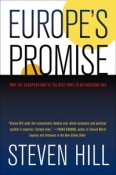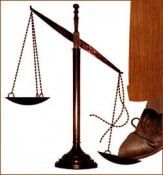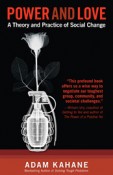Q&A: STEVEN HILL, Author – Europe’s Promise
Written on June 2nd, 2010 |
Aired 05/30/10
We're hearing a lot about the trouble Europe is in. The debt crisis in Greece, and perhaps Spain, Portugal, and Italy, is threatening the Euro and the European Union. What's really going on? How did it happen? How bad is it? How will they deal with it? And what does it mean for the rest of the world and for the US in particular?
We'll deal with those issues this Sunday, but that's not all. While the bad news of this Euro crisis makes headlines in the US, a quiet and successful revolution taking place in Europe does not. Europe seems to be finding a way to make capitalism and democracy work for people, not just for corporations. I think this is a critical unreported story in terms of its potential impact. Here's just a few things you may not have heard about.
The European Union, 27 member nations with a half billion people, has become the largest, wealthiest trading bloc in the world, producing nearly a third of the world's economy - nearly as large as the U.S. and China combined. Europe has more Fortune 500 companies than either the US, China or Japan.
European nations are rated by the World Health Organization as having the best health care systems in the world. Yet they spend far less than the United States for universal coverage, even as U.S. health care is ranked 37th.
Europe leads in confronting global climate change with renewable energy technologies like solar and wind power, conservation and "green design," creating hundreds of thousands of new jobs in the process. Consequently, Europe's ecological "footprint" (the amount of the earth's capacity that a population consumes) is about half that of the United States for the same standard of living.
Q&A: BOB EDGAR, Pres./CEO of Common Cause – SCOTT NELSON, Attorney
Written on January 29th, 2010 |
Aired 01/24/10
Has government of, by and for the people perished from the United States?
January 21st, a divided Supreme Court reversed precedent and law, voting 5-4 in Citizens United v. FEC to remove limits on corporate contributions to political campaigns. We'll discuss the decision in the context of money in politics, looking at potential outcomes and possible remedies.
BOB EDGAR is President and CEO of Common Cause, a grassroots advocacy organization working for democracy reform, with nearly 400,000 members and supporters and state chapters in 36 states. Edgar previously served as general secretary of the National Council of the Churches of Christ in the USA, the leading U.S. organization in the movement for Christian unity, and before that as president of the Claremont School of Theology. He was elected to the U.S. House in 1974, the first Democrat in 82 years to represent the heavily Republican 7th Congressional District near Philadelphia.
SCOTT NELSON is an attorney at the Public Citizen Litigation Group in Washington, D.C., where he has practiced since August 2001. After graduating with honors from Harvard College, Nelson attended Harvard Law School, and was elected President of the Harvard Law Review in 1983. He then served as a law clerk to Supreme Court Justice Byron White. Nelson represented key Congressional sponsors of McCain-Feingold before the Supreme Court in Citizens United v. Federal Election Commission.
http://www.commoncause.org/
http://www.publicintegrity.org/
http://www.citizen.org/
http://www.publicampaign.org/
http://www.thealliancefordemocracy.org/
http://www.movetoamend.org/
http://www.freespeechforpeople.org/
Q&A: ADAM KAHANE, Author – Power and Love
Written on January 5th, 2010 |
Aired 12/27/09
When I received the book Power and Love, I was struck first by the ambition of anyone who would take on those two big notions. Then I read the subtitle A Theory and Practice of Social Change, and I was really curious. Its author Adam Kahane has been working for social change on a big scale all over the world. In the early 90s he facilitated the Mont Fleur Scenario Project, in which a diverse group of South Africans worked together to effect the transition to democracy. I’d let him tell you more about that, and he had learned some hard lessons that led to this book. Let me just read this quote:
Over the past twenty years of work, I have made two discoveries. I reported the first one in Solving Tough Problems: An Open Way of Talking, Listening, and Creating New Realities. In that book I concluded that the key to creating new social relaites is to open ourselves up and connect: to our own true selves, to one anotherm and to our context and what it demands of us. Five years and many experiences later, I can see that this conclusion was right, but only half right and dangerously so.
That last phrase – "dangerously so" -- really caught my attention.
